SDTEST® has 36 different VUCA polls that calculate the 13,034 correlation values between stages of development according to the theory of Spiral Dynamics and answer options of these 36 polls.
We invite curiosity about the systemic mechanisms behind this correlation. There may be hidden variables that provide alternative explanations.
In our analysis of the poll "Where would be your next most exciting opportunity?", we found an intriguing negative correlation that warrants closer examination:
-0.0642 between the In a Startup / Scale-up! and the Purple stage.
The critical value of the correlation coefficient for a normal distribution, by William Sealy Gosset (Student) r = 0.0589. This negative correlation of -0.0642 meets the reliability criteria but does not necessarily imply causation.
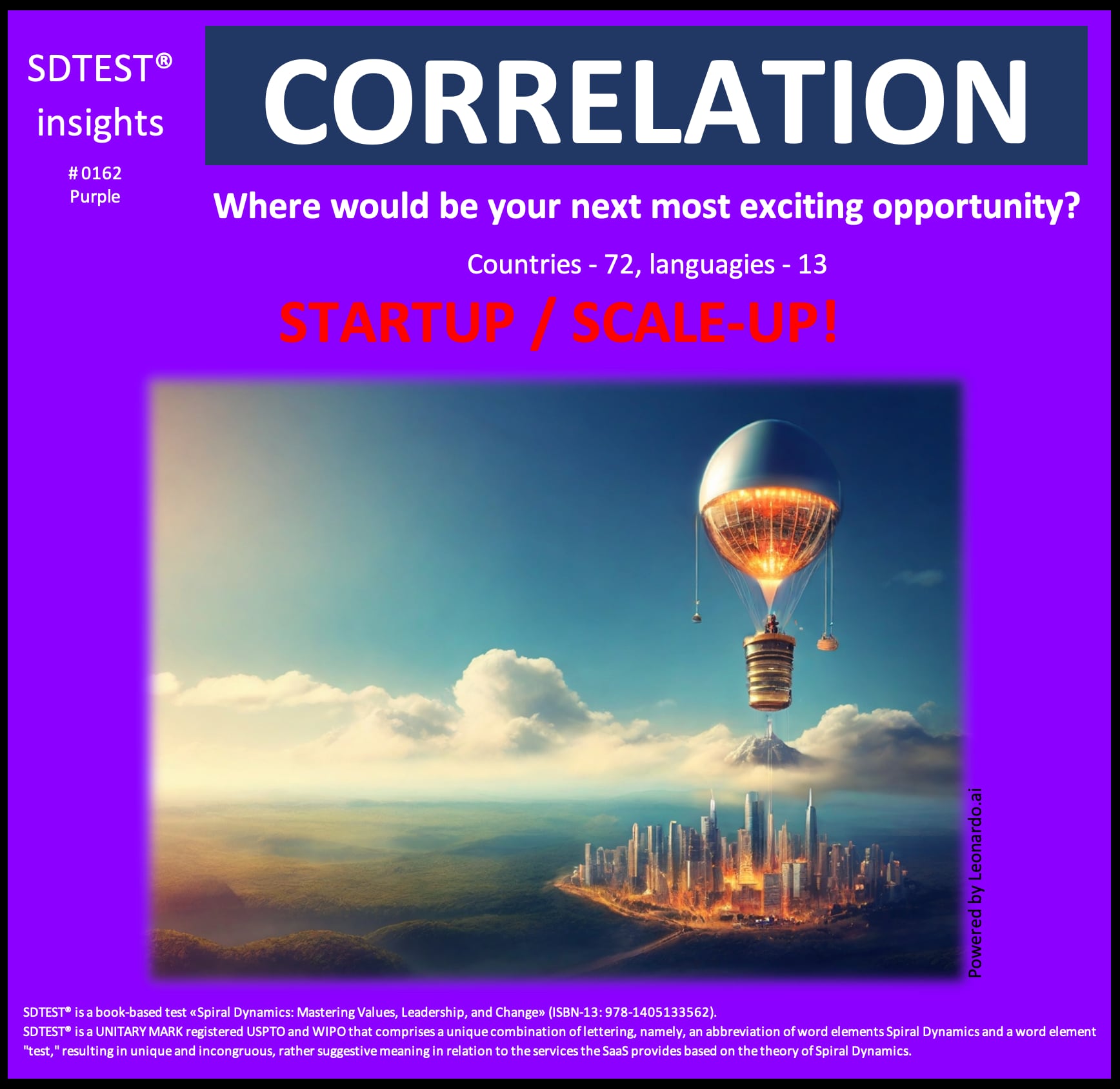
This negative correlation of -0.0642 reflects different perspectives on being excited about working at a startup/scale-up and association with the Purple value system:
Organizational Perspective:
For organizations steeped in the Purple worldview, tradition, spiritual belief systems, and deference to authority are core values. This negative correlation suggests that Purple-oriented companies may view the inherent disruption and rapid change associated with startups as threatening to their established norms, myths, and ceremonial ways of operating. They likely prioritize preservation over venture into the new.
Team Perspective:
Teams functioning from the Purple frequency place tremendous importance on cohesive group identity, belonging, and respecting supernatural or mystical forces. The negative correlation implies such teams may perceive the fast-paced, high-risk nature of startup environments as undermining the stability and collectivistic worldview central to their ethos. Bucking traditional career paths could challenge their drive for concordance.
Individual Perspective:
At an individual level, those predominantly residing in the Purple vMeme tend to find meaning through connection to ancestral wisdom, rites of passage, and honoring elders. This correlation suggests that for Purple individuals, the intense hustle culture and focus on disruptive innovation synonymous with startups may clash with their reverence for time-honored ways. They could view such environments as profaning sacred traditions.
Ultimately, this negative correlation reveals an innate tension between the Purple stratum's drive to uphold intergenerational certainties and startups' imperative to create novel futures dynamically. The liminal, shape-shifting world of entrepreneurial ventures may represent an affront to Purple's anchoring in mythological, a-perspectival truths—a step too far into the unknown for those seeking transcendent security.
In our analysis of the poll "What makes a boss a great leader?" we found an intriguing negative correlation that warrants closer examination:
-0.0304 between the Empathy and the Red stage.
The critical value of the correlation coefficient for a non-normal distribution, by Spearman r = 0.0018. This negative correlation of -0.0304 meets the reliability criteria but does not necessarily imply causation.
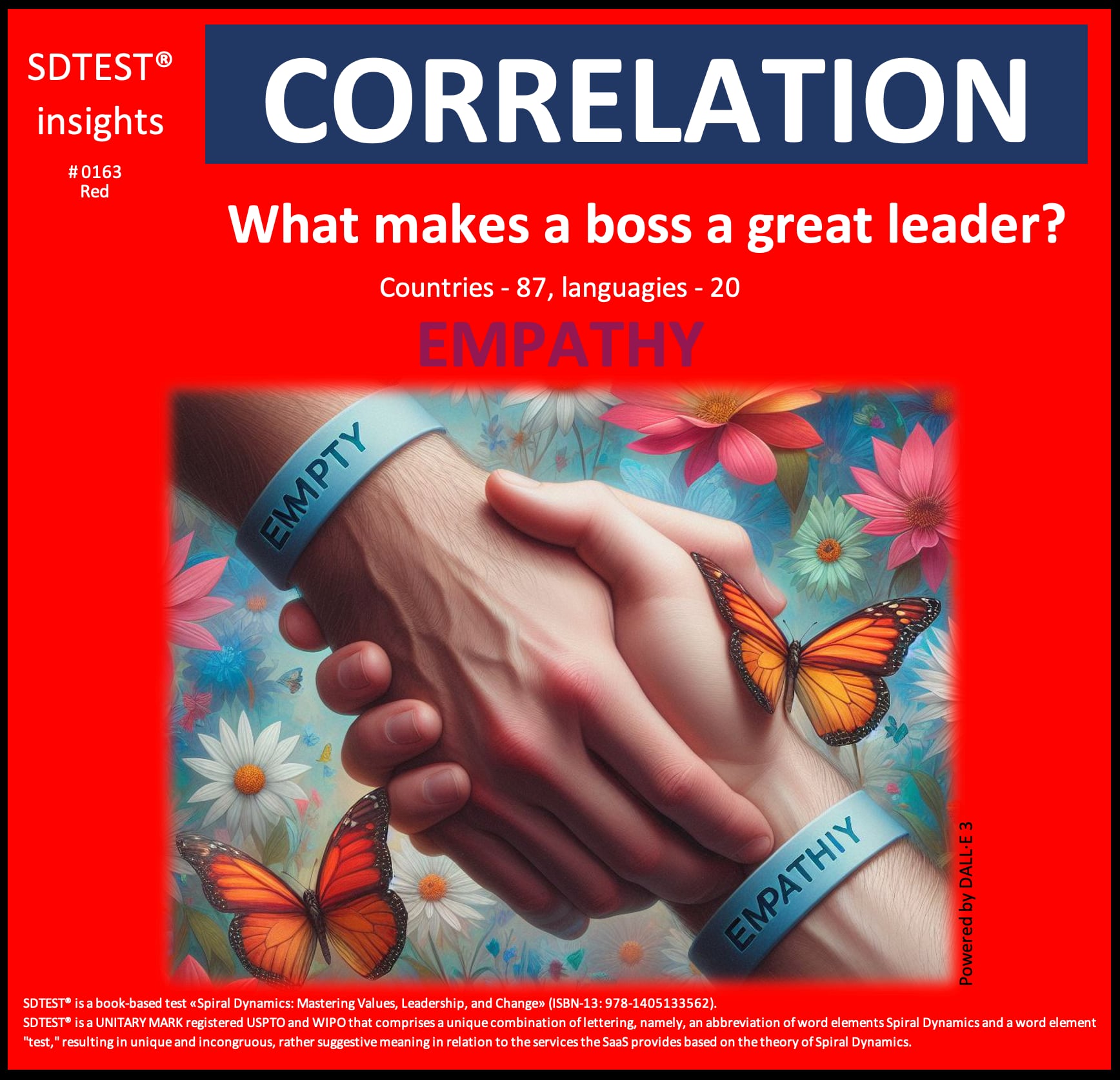
This negative correlation of -0.0304 reflects different perspectives on the valuing of empathy in leaders and its association with the Red value system:
Organizational Perspective:
Organizations dominated by the Red vMeme prioritize power, control, and immediate self-interest over emotional attunement. This negative correlation suggests that Red companies may view empathetic leadership as a weakness undermining a robust and uncompromising authority structure. They likely prize decisiveness and domineering styles over inclusive relationship-building.
Team Perspective:
Teams operating from the Red frequency often have an intense competitive focus and hierarchical dynamics. The negative correlation implies that for these groups, empathic leadership could be perceived as softness antithetical to their primal drive to subjugate rivals and assert individual superiority. They may instinctively reject vulnerability and care as signs of inadequate ruthlessness.
Individual Perspective:
Those whose primary being-coping mode resides in Red tend towards impulsive self-gratification and mistrust of anything, constraining their personal expression. This correlation suggests that for quintessential Red individuals, empathic bosses introducing emotional nuance threaten to impinge on their perceived freedoms. They may see such leaders as overly complicated or even manipulative.
Ultimately, this negative correlation lays bare a fundamental rift between the Red paradigm and emotional intelligence capabilities like empathy. Red's fixation on unfettered ego assertion appears inherently at odds with the self-other integrating awareness empathic leadership demands. Any concessions to shared vulnerability could be experienced as deflating one's force of willful individuation.
0.2809 between the High salary and the Blue stage.
The critical value of the correlation coefficient for a normal distribution, by William Sealy Gosset (Student) r = 0.2757. This positive correlation of 0.2809 meets the reliability criteria but does not necessarily imply causation.

This positive correlation of 0.2809 reflects different perspectives on prioritizing high salary and being associated with the Blue value system:
Organizational Perspective:
Organizations firmly rooted in Blue values tend to have rigid hierarchical structures, clearly delineated roles, and an emphasis on following established protocols. This positive correlation suggests that Blue companies may incentivize employees via high salaries to reinforce loyalty, obedience to rules, and commitment to one's prescribed duties within the overarching order. Compensation becomes a metric of membership.
Team Perspective:
Teams operating on the Blue wavelength typically prize virtues like discipline, dutifulness, and respect for authority. The correlation implies that a high leadership salary for Blue-oriented groups acts as an extrinsic motivator, reinforcing conformity to expected behaviors and roles within the hierarchy. It symbolizes their positional standing for services rendered to the collective code.
Individual Perspective:
Those whose core level of being radiates Blue energy tend to find meaning through sacrifice to an embraced higher cause, deferring to tradition, and subdividing responsibilities. This correlation suggests that Blue individuals may associate a high salary with receiving their earned dues for steadfast commitment to the prevailing moral order - a hard-earned reward for subjugating personal desires to one's rightful place.
Ultimately, this positive correlation exposes the Blue cadence's profoundly extrinsic relationship to material incentives like generous salaries. Rather than representing aspirational ends, ample compensation embodies receiving one's contractually and ethically prescribed allotment for adherence to the immutable structure of roles and just hierarchies.
In our analysis of the poll "A.I. and the end of civilization" (by Elon Musk), we found an intriguing negative correlation that warrants closer examination:
-0.1244 between the Artificial intelligence is dangerous to human civilization / Strongly agree and the Orange stage.
The critical value of the correlation coefficient for a normal distribution, by William Sealy Gosset (Student) r = 0.083. This negative correlation of -0.1244 meets the reliability criteria but does not necessarily imply causation.
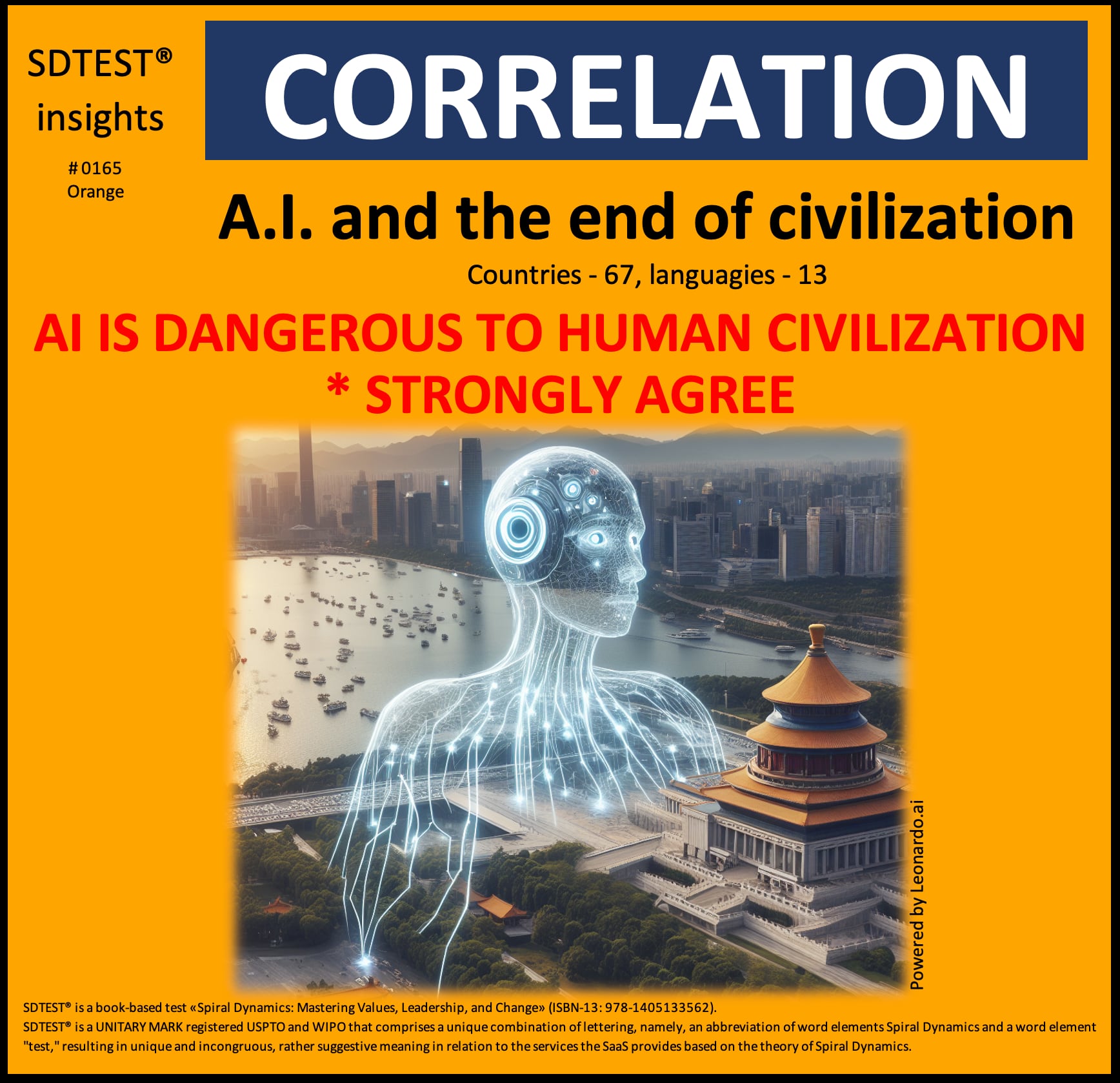
This negative correlation of -0.1244 reflects the different perspectives on strongly agreeing that AI poses an existential risk to human civilization and is associated with the Orange value system:
Organizational Perspective:
Companies operating firmly in the Orange pragmatic wavelength prioritize empiricism, calculated risk-taking, and an ethos of continual scientific and technological progress. This negative correlation suggests Orange organizations are less inclined to view AI through an apocalyptic, civilization-ending lens. They likely see it as another frontier to master through rational deduction and iterative innovation cycles systematically.
Team Perspective:
High-performing Orange teams epitomize the tenets of meritocratic achievement, systematic analysis, and optimizing for measurable results. The negative correlation may signify that such teams are more inclined to approach AI risks through a purely technical, solvable problem framing versus harboring existential doubts. Their competitive streaks likely orient them towards ambitious opportunity-seeking over catastrophizing.
Individual Perspective:
Those centered in the archetypal Orange individual stance tend to be self-directed, ambitious, and exhibit a spirit of empirical questioning. This correlation implies that people may be less prone to alarmist viewpoints around transformative technologies like AI. Their trust in human ingenuity's ability to bend science to its rational will could supersede dystopian narratives.
Ultimately, this negative correlation betrays the quintessential Orange mindset's orientation as pragmatic solution-finders utilizing logical frameworks to dismantle perceived obstacles systematically. While existential AI risks aren't necessarily dismissed, the Orange prime directive gravitates towards leveraging science to engineer desired outcomes. Pessimistic narratives are recontextualized as fresh challenges for the indomitable spirit of systematic human reason.
In our analysis of the poll "Why People Resist Change" (by Siobhán McHale [1]), we found an intriguing positive correlation that warrants closer examination:
0.2516 between the Poor communication and the Green stage.
The critical value of the correlation coefficient for a normal distribution, by William Sealy Gosset (Student) r = 0.1856. This positive correlation of 0.2516 meets the reliability criteria but does not necessarily imply causation.
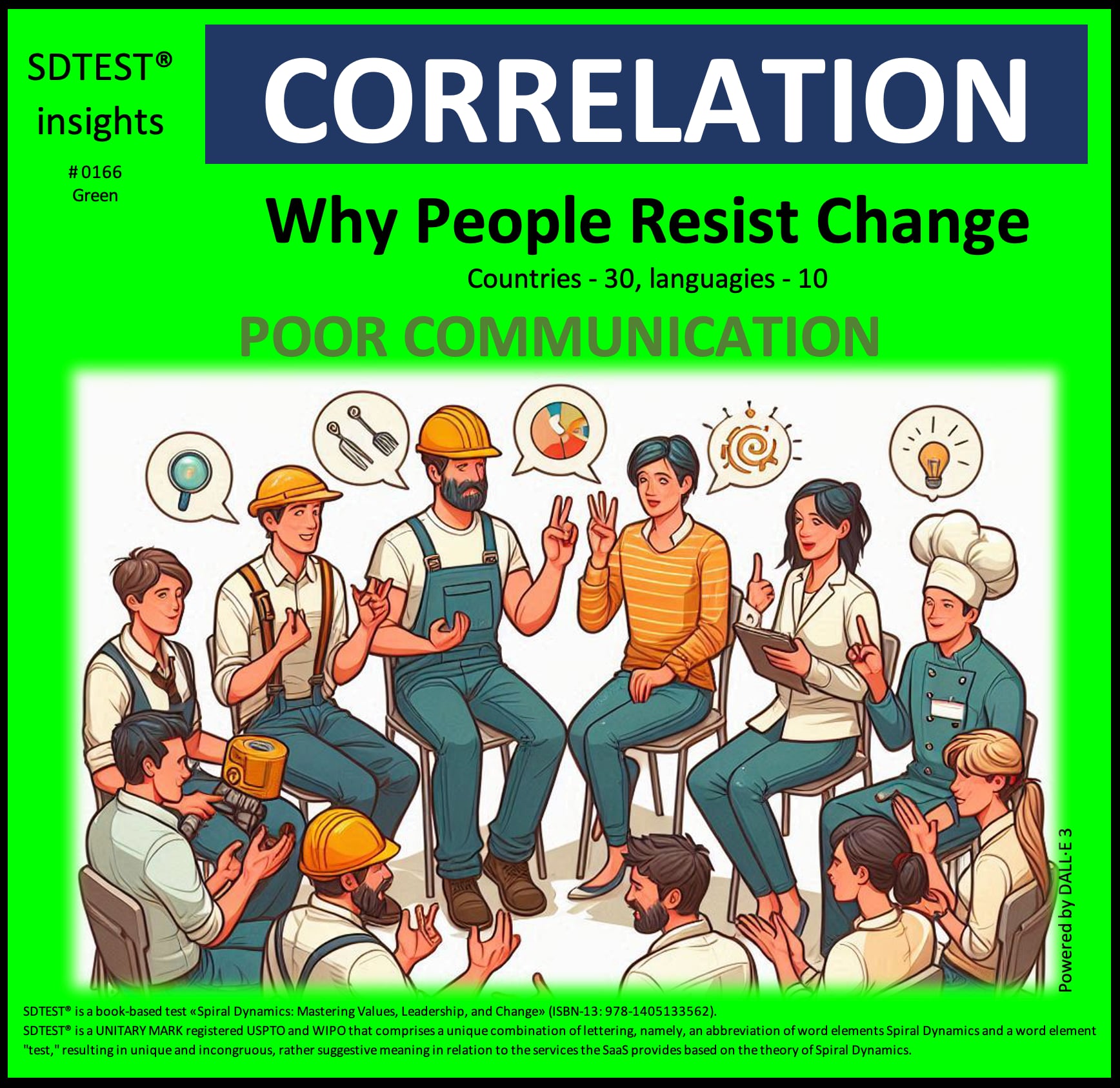
This positive correlation of 0.2516 reflects different perspectives between citing poor communication as a reason for resisting change and association with the Green value system:
Organizational Perspective:
Organizations embodying Green values emphasize holistic well-being, participatory decision-making, and inclusive dialogue. This positive correlation suggests that Green companies understand that change efforts fail when communication breaks down, and diverse voices aren't integrated. They likely prioritize transparency and co-creating shared narratives to soften resistance.
Team Perspective:
Teams operating from the Green frequency value cohesion, egalitarian dynamics, and unity through an open exchange. The positive correlation implies that such teams view poor top-down communication around changes as antithetical to their collaborative ideals. They may instinctively resist changes introduced without honoring their multifaceted perspectives.
Individual Perspective:
Those oriented toward Green worldviews tend to find meaning through interpersonal connection, empathy, and flattened hierarchies. This correlation suggests Green individuals may resist change fueled by opaque, one-way communication lacking emotional resonance. They likely crave context, vulnerability, and co-creation of shared understanding.
Ultimately, this positive correlation reveals that within the Green altitude, the notion of "poor communication" represents an existential breach. Green's ideals - equality, integration, mutual understanding - are contingent upon adept translation between diverse experiential frames. Any imposition lacking multilateral dialogue and systemic context risks evoking reflexive resistance rooted in sheer principle.
0.0589 between the Clear communicator and the Yellow stage.
The critical value of the correlation coefficient for a normal distribution, by William Sealy Gosset (Student) r = 0.042. This positive correlation of 0.0589 meets the reliability criteria but does not necessarily imply causation.
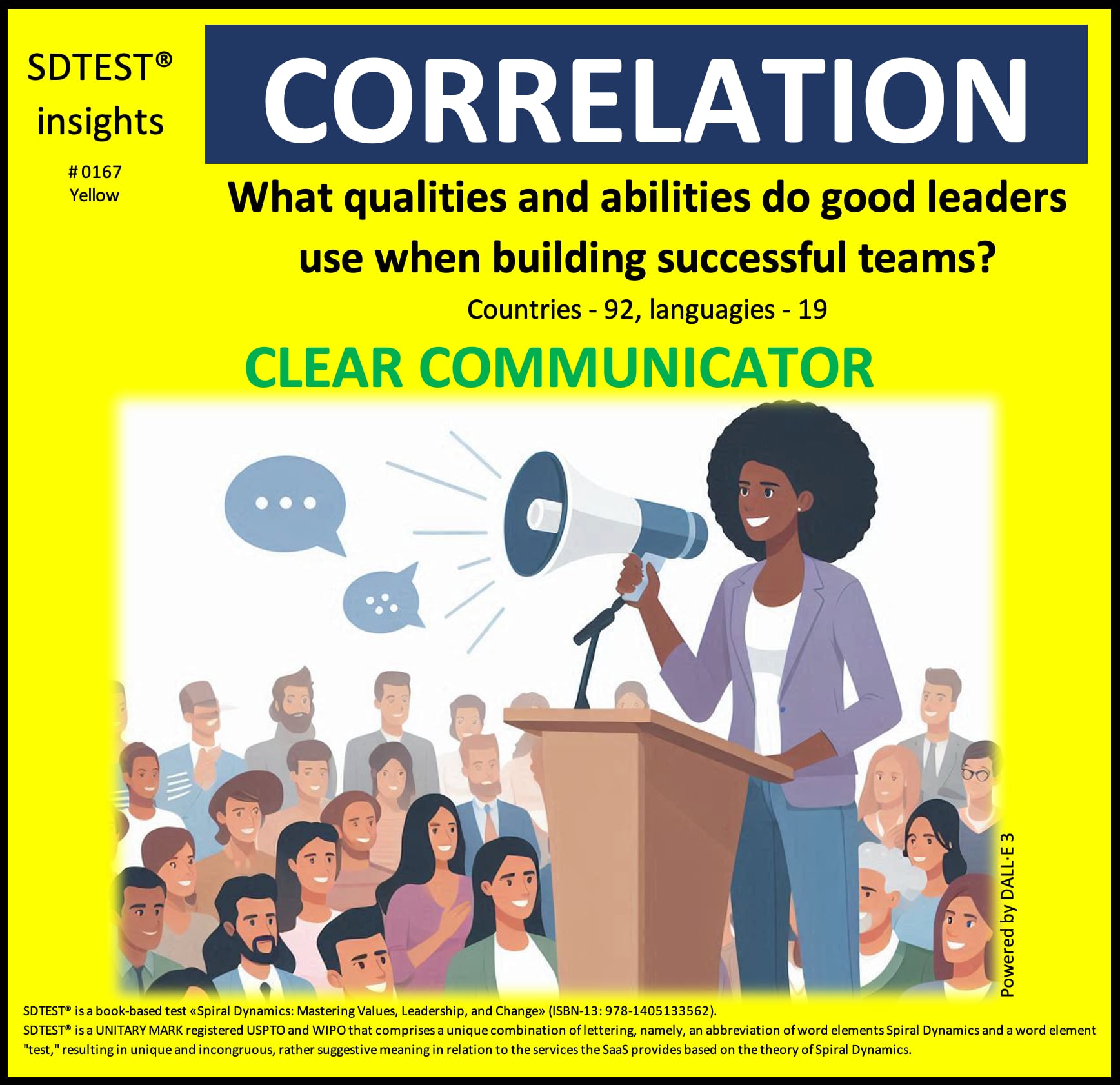
This positive correlation of 0.0589 reflects different perspectives on valuing clear communication in leaders and association with the Yellow value system:
Organizational Perspective:
Organizations operating from the Yellow frequency tend to embrace complexity, multiple perspectives, and holistic worldviews. This positive correlation suggests Yellow companies appreciate how deft communication is essential for integrating disparate outlooks and co-creating shared understanding in intricate systems. They likely prioritize leaders who can translate between diverse experiential frames.
Team Perspective:
High-performing Yellow teams epitomize the fluidity of holding multiple contexts simultaneously. The positive correlation implies that such teams instinctively gravitate toward leaders capable of crystallizing nuanced insights and harmonizing paradoxical tensions through precise, evocative communication. Unclear expression represents a deal-breaker for cohering their integrative praxis.
Individual Perspective:
Those self-actualizing into the rarefied Yellow altitude seek continual growth by marrying seeming dualities into higher unities. This correlation suggests that for Yellow individuals, clear communicators capable of rendering the pre-reflective conscious embody idealized guides. They provide luminous beacons illuminating vast interiors and blending singular and plural.
Ultimately, this positive correlation reveals that virtuosic communication becomes synonymous with the very engine of integration and transcendence at the Yellow tier. By elucidating dynamic interplays between part and whole, clear communicators enable differentiated/patterned flow synergy - the leading edge of Yellow's evolutionary current. Artful expression is revered as the royal road to realizing humanity's vast, unbounded potential.
0.1834 between the Practice of mindfulness and the Turquoise stage.
The critical value of the correlation coefficient for a normal distribution, by William Sealy Gosset (Student) r = 0.0692. This positive correlation of 0.1834 meets the reliability criteria but does not necessarily imply causation.

This positive correlation of 0.1834 reflects different perspectives on practicing mindfulness for mental health and association with the Turquoise value system:
Organizational Perspective:
Organizations embodying the Turquoise consciousness tend to view themselves as living systems embedded within vast interconnected networks. This positive correlation suggests that Turquoise companies appreciate how mindfulness practices can help attune their workforce to the interdependence of individual, collective, and environmental well-being. They likely encourage contemplative disciplines to cultivate holistic awareness.
Team Perspective:
High-functioning Turquoise teams tend to display a symbiotic flow state synergy where the whole becomes more than its parts. The positive correlation implies that such teams instinctively resonate with mindfulness to entrain their unified field of co-arising with the governing patterns of systemic balance and natural cycles. Meditation aligns them with source dynamics.
Individual Perspective:
Those self-actualizing into the Turquoise altitude tend to experientially transcend identification with any single state, role or perspective. This correlation suggests that for the quintessential Turquoise individual, mindfulness practices enable the profound letting-go into awareness itself - a surrender into the universal pattern that endlessly re-generates all perspectival worlds while abiding as the infinite depth of potentiality.
Ultimately, this positive correlation reveals mindfulness as a profound technology of embodied participation within the Turquoise paradigm. By evacuating the trance of egoic separateness, one bears intimate witness to the seamless, spontaneous blossoming of interdependent co-arising. Mindfulness is thus a portal for resacralizing the living altar of integrated Kosmic Communion.
What insights do you gain from today's correlation? How might we study this relationship more carefully before deducing causation?
We welcome respectful and wise perspectives! Stay tuned every week as we share more results and insights.
After login or registration, free access to the poll results in the FAQ section.
[1] https://www.linkedin.com/in/mchalesiobhan
2024.06.16
FearpersonqualitiesprojectorganizationalstructureRACIresponsibilitymatrixCritical ChainProject Managementfocus factorJiraempathyleadersbossGermanyChinaPolicyUkraineRussiawarvolatilityuncertaintycomplexityambiguityVUCArelocatejobproblemcountryreasongive upobjectivekeyresultmathematicalpsychologyMBTIHR metricsstandardDEIcorrelationriskscoringmodelGame TheoryPrisoner's Dilemma
Valerii Kosenko
Vlastník produktu SaaS SDTEST®
Valerii získal kvalifikáciu sociálneho pedagóga-psychológa v roku 1993 a odvtedy svoje znalosti uplatňuje v projektovom manažmente.
Valerii získal magisterský titul a kvalifikáciu projektového a programového manažéra v roku 2013. Počas magisterského štúdia sa zoznámil s Plánom projektu (GPM Deutsche Gesellschaft für Projektmanagement e. V.) a Špirálovou dynamikou.
Valerii je autorom skúmania neistoty V.U.C.A. koncept využívajúci špirálovú dynamiku a matematickú štatistiku v psychológii a 38 medzinárodných prieskumov verejnej mienky.










